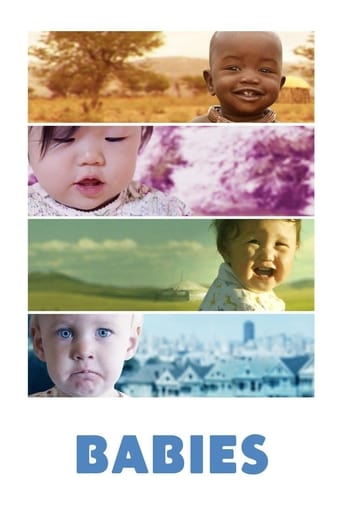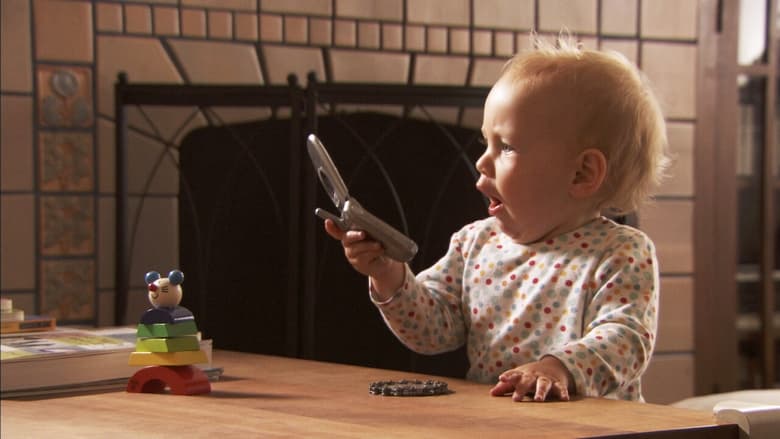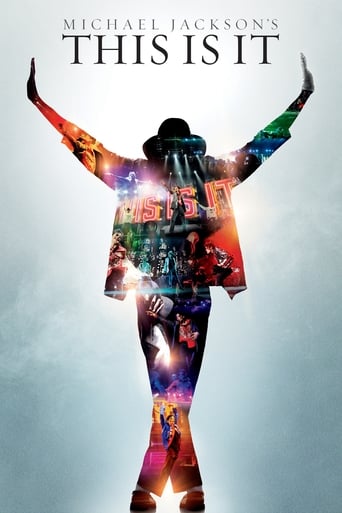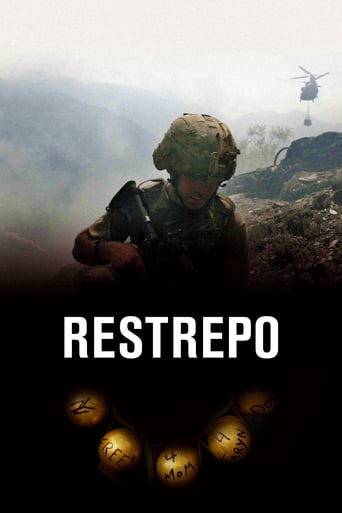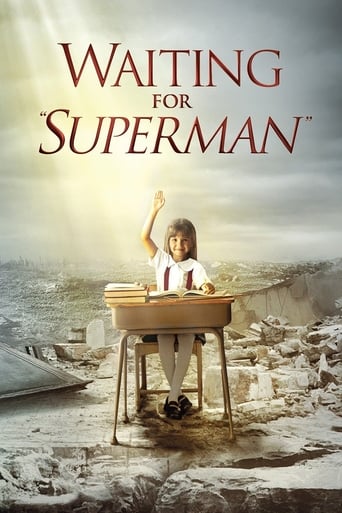Babies (2010)
Babies, also known as Baby(ies) and Bébé(s), is a 2009 French documentary film by Thomas Balmès that follows four infants from birth to when they are one year old. The babies featured in the film are two from rural areas: Ponijao from Opuwo, Namibia, and Bayar from Bayanchandmani, Mongolia, as well as two from urban areas: Mari from Tokyo, Japan, and Hattie from San Francisco, USA.
Watch Trailer
Cast


Similar titles
Reviews
The Worst Film Ever
As Good As It Gets
It’s fine. It's literally the definition of a fine movie. You’ve seen it before, you know every beat and outcome before the characters even do. Only question is how much escapism you’re looking for.
This is one of the best movies I’ve seen in a very long time. You have to go and see this on the big screen.
Most often-repeated baby-quotes - "Goo-goo! Ga-ga!" and "Gurgle-gurgle-gurgle!"Seriously, folks - When it comes to babies - Whether you call them rugrats, ankle-biters, sprogs, or sweetie-pies - You can be certain of one thing that they all do best.... And, that is - Cry! - OK - They crawl pretty good, too. (As is clearly evident in this documentary)Now, don't get me wrong here - I ain't no baby-hater - Well, I ain't - But, for me to say that this documentary about babies could have been a helluva lot better would be an understatement of the highest order..... To me, this documentary was like being forced to watch boring baby home-videos for 80 solid minutes without any commercial breaks to help alleviate the monotony of it all.Yeah. Sure. Babies are undeniably cute, little critters - But, with that said - (As my eyes glaze over) - The point of this documentary got totally lost on me after its first 15 minutes. It's documentation of 4 babies from 4 different cultures literally went nowhere.
I am a professed baby junkie. Merely seeing a baby or toddler in person or in a picture elates and uplifts my mood and emotions. Therefore, I predicted that I would appreciate and savor the "Babies" DVD I purchased recently. My prediction satisfyingly came true. "Babies" is a contemplative but absorbing celebration of these remarkable beings.The movie is essentially a "What if" stylistic experiment. What if we followed the broad outlines of a wildlife documentary, but with the subject being young human children instead of lions or elephants? What if we select a global approach by focusing on four children (one African, two Asian, and one North American) and compare and contrast their babyhood? What if we improved on the wildlife documentary and eliminated the distracting narration and commentary that purports to understand the subjects' motivations? What if we simply sit and watch the babies do their things and draw our own individual conclusions? It's a daring, risky approach and will not appeal to all cinematic tastes.For example, if you prefer fast-paced, action-oriented documentaries, you probably won't enjoy "Babies". If you prefer deliberate, observant, leisurely paced stories, you will probably be more partial to the story. Of course, if you adore children, you will find paradise. The babies are the Namibian girl Ponijao, the Mongolian boy Bayarjargal, the Tokyo girl Mari, and the San Franciscan girl Hattie. We see all four during the interval from birth to about one year old. We see them interacting with their parents, their siblings, other babies, and their environment. They all exhibit the behaviors we expect from babies: wonderment, curiosity, contentment, frustration, fear, and triumphant satisfaction. We see them grow in experience and independence. Even though they may occasionally face an overzealous sibling, a scary gorilla and tiger, or a boring Native American spirit exhortation, all the babies exhibit spunk, intelligence, perception, and resilience. It's fun, charming, and even emotional to watch them react to something, and sometimes not even react at all as life swirls around them. I simply loved them all, and was relieved and gratified that their parents seemed to do so as well.Of course, the babies' socioeconomic backgrounds run the gamut from the "primitive" savanna to the ultra-modern city, with Bayarjargal's milieu being an unusual hybrid of Mongolian farming steppe and technologically advanced yurt (including a laptop computer and satellite dish). But as other posters have commented, babies really don't care a whit about wealth and possessions. All that matters is that they receive love, support, and guidance, and they certainly do. Also, each baby is allowed a certain amount of freedom to explore his or her surroundings; no parent, when we occasionally see them, acts as a jailer or micromanager. They step in only when they have to (i.e. the baby is in danger of being hurt - which very seldom happens in the movie).I think part of a baby's appeal is their ultimate mystery. Sure, we can usually figure out (from coos and cries) whether a baby is happy, sad, or frightened. But when they simply stare at something, what are they thinking? Nobody, not even the baby, really knows. I appreciate that "Babies" keeps silent and non-judgmental about that mystery and does not indulge psychological theories and speculation about the children's' motivations. However, the viewer may come up with some of his or her own.The movie rotates more or less in sequence among the four children, which all more or less receive equal time. Again, the movie is non-judgmental about the children's' race and circumstances; for example, it does not wring its hands about Ponijao's "poor" upbringing or tout Mari's and Hattie's formative advantages (e.g. baby yoga classes). Babies don't care about those things and the movie gently reminds us that adults shouldn't either. All that matters are the love babies receive and the pleasure they give in return."Babies" made me chuckle with the children's unself-conscious antics but even more often made my eyes mist with their mere presence. The movie reminds us that babies are one of nature's (God's) true masterpieces and that their existence is a comforting reminder of humanity's ultimate immortality.
My (pregnant)wife and i just returned from a little movietheater in the city of Utrecht where we saw the movie with eight other people. But the sun was shining bright, so that may be the reason for so little people in the theater.A true documentary as a documentary should be. Just let the pictures speak. No comments, no translations, just the pictures.The documentary shows periods in the babies lives. In my view all four babies are shown in all the different periods and parts of their lives; how they play, how they are fed etc.Fine camera-work and a non-disturbing soundtrack. Absolutely a must see for parents who are pregnant !
Having recently celebrated the birth of Liliana, our first grandchild, I admit I am a little biased toward babies in general and the documentary Babies by Thomas Balmes in particular. The film, however, stands on its own as a joyous celebration of the first year of life for four youngsters in different parts of the world. Filmed without narration, subtitles, or any comprehensible dialogue, Babies is a direct encounter with four babies who stumble their predictable ways to participating in the awesome beauty of life.Enhanced by the inspiring music by Bruno Coulais, we follow Mari, a little girl in Tokyo Japan; Ponijao, another girl living in Namibia in Africa with their mother and eight brothers and sisters; Bayer (Bayarjargal) a boy who lives in Mongolia; and Hattie, definitely the most privileged of the four who lives with her apparently super aware parents in San Francisco. Watching their development over the first twelve months of life is a direct experience of the enchantment that life has to offer. The babies laugh, they cry, they play, they get frustrated, they poop, and they bask in the loving tenderness of those around them.Needless to say, their experience of the first year of life is vastly different, yet what stands out is not how much is different but how much is universal as each in their own way attempts to conquer their physical environment. Mari becomes frustrated as she sets about getting the hang of teaching toys by attempting to place a spindle into the hole of a disc. Bayer unravels a role of toilet paper and then takes bites out of it when it is all undone. Hattie crawls towards the door during a parental ecology meeting in San Francisco as if to say, "Get me out of here, I've had enough of this".Though the language is different as well as the environment, the babies cry the same, laugh the same, and try to learn the frustrating, yet satisfying art of crawling, then walking in the same way. Of course, those in Tokyo and San Francisco have definite physical advantages over their young counterparts in Mongolia and Namibia. Hattie has the advantage of cultured and literate parents who read to her and show her books with the title "No Hitting." Bayer and Ponijao live close to earth, naturally sitting with goats or playing among cows, having their tongue licked by a dog, and even drinking water out of a dirty stream, yet we are confident that life for Bayer and Ponijao, though culturally different than for Hattie and Mari, will survive and prosper by the loving ways of their own parents and the environment in which they live. You will either find Babies entrancing or slow moving depending on your attitude towards babies because frankly that's all there is, yet for all it will be an immediate experience far removed from the world of cell phones and texting, exploring up close and personal the mystery of life as the individual personality of each child begins to emerge. For me, it was difficult to resist.

